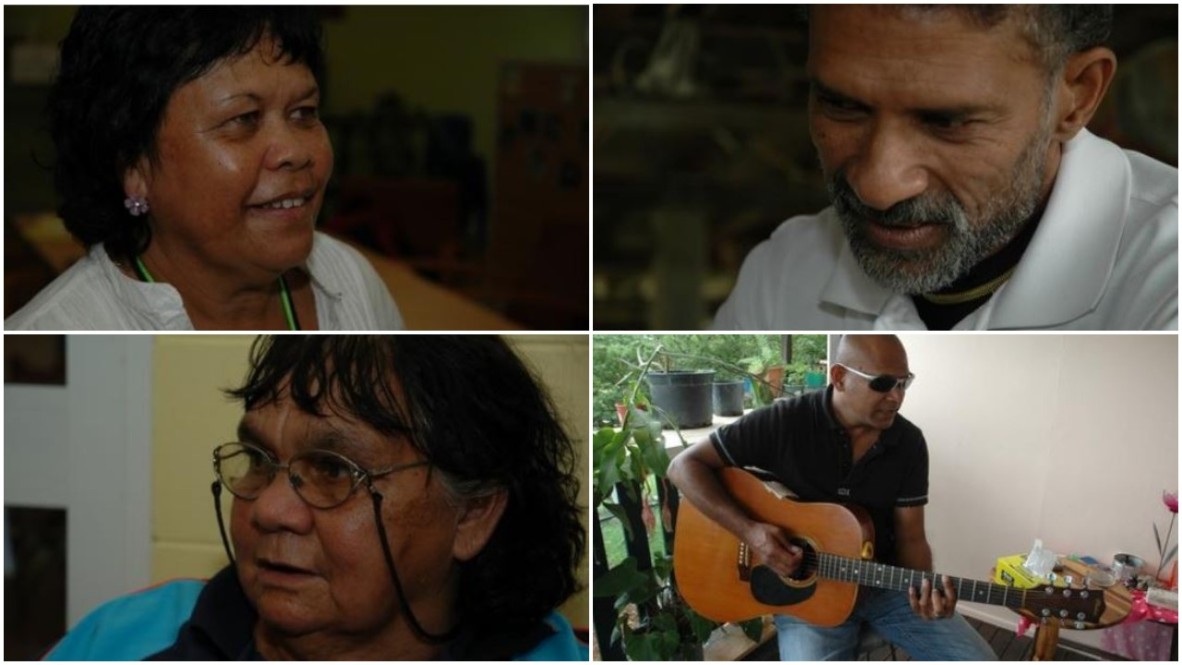Responses to the National Apology to the Stolen Generations : Cairns, Cooktown and Hope Vale
By JOL Admin | 9 February 2018
On 13 February 2008, Prime Minister Kevin Rudd delivered the historic Apology to the Stolen Generations on behalf of the Parliament of Australia. Following the Apology, State Library of Queensland captured responses from a number of Queenslanders from a range of backgrounds and geographic locations, recording their impressions, feelings and memories surrounding this event.

Snapshots of a selection of those interviewed in Cairns, Cooktown and Hope Vale for their response to the Prime Minister's Apology to the Aboriginal and Torres Strait Islander people, 2009.
In June 2008, State Library, with assistance from Queensland University of Technology and Queensland’s Aboriginal and Torres Strait Islander communities, recorded digital stories (2-4 minute videos) with a group of Brisbane residents. This project later extended to encompass regional Queensland with stories gathered from residents of Cairns, Cooktown, Hope Vale and Mount Isa.
The following stories were recorded in Cairns, Cooktown and Hope Vale in May 2009. The information about each interviewee was captured at the time of recording and may no longer be current.
John Wenitong is the National Indigenous Education Development Officer for the Cape York Institute. He is descended from the Kabi Kabi group from southeast Queensland. John describes what he did on 13 February 2008, particularly receiving numerous emails and phone calls from friends and colleagues. John explains how private philanthropy increased dramatically as a result of the Apology and how important it is for Australians to be proud of their Indigenous people. (Duration – 4 min. 26 sec.)
Frankie Deemal is a Guugu Yimithirr man from the Thiithaarr clan. He was involved in founding the Cape York Land Council. Frankie talks about the event that was organised at the Hope Vale PCYC to view the Apology. Frankie also talks about the Stolen Generation as well as the entire community from Hope Vale that was removed to Woorabinda during World War II. (Duration – 2 min. 51 sec.)
Mark Wenitong is Senior Medical Officer at Apunipima Cape York Health Council. Mark has been President of the Australian Indigenous Doctors’ Association. He is of Kabi Kabi descent. Mark describes his reaction to the Apology and how he feels it was important for the social and emotional wellbeing of Indigenous people in Australia. He also outlines how he feels government should be "closing the gap" between Indigenous and non-Indigenous life expectancy. (Duration – 3 min. 01 sec.)
Val Schier was elected Mayor of the Cairns Regional Council in 2008. She is originally from Falmouth, a small village on the Tasmanian North East coast. Val talks about the Cairns Regional Council's previous engagement with Aboriginal and Torres Strait Islander coummunities. (Duration – 4 min. 20 sec.)
Terry O'Shane is Chairman of the North Queensland Land Council. His mother, Gladys O'Shane, was President of the Cairns Aborigines and Torres Strait Islander Advancement League in 1958. Terry talks about how growing up with a father who was Irish and a mother of Aboriginal descent, he was unable to go to Yarrabah and visit his relatives. He explains the inter-generational effects of previous Government policies and how a formal apology needs to seriously understand those effects for it to have any meaning. (Duration – 2 min. 26 sec.)
Estelle Bowen is a local Family Responsibilities Commissioner in Hope Vale. Her father was a Gugu Dhayban man from near Lakefield National Park. Estelle tells the story about her father, who was taken away from his mother at Lakefield National Park to Hope Vale. She explains how seeing the effects of her father being a member of the Stolen Generation has motivated her to be pro-active in keeping fostered children in their community. (Duration – 4 min. 09 sec.)
Des Bowen has been a Hope Vale councillor and helped establish the Pelican project. Des talks about watching the Apology in Cairns Hospital after injuring his foot. He tells the story about his workmates calling him up to offer him support after the Apology. (Duration – 2 min. 58 sec.)
Peter Scott is Mayor of Cook Shire Council. He has spent time working around country Australia and Papua New Guinea. Peter talks about Cooktown being the first site of Aboriginal and European reconciliation in Australia and how that spirit has continued today in the Shire. (Duration – 2 min. 59 sec.)
Dora Gibson is a teacher at Hope Vale State School and has lived in Hope Vale for most of her life. Dora talks about her grandfather, George Bowen, who came from Bowen to Hope Vale. She talks about self-identification and how people's names were changed according to their place of origin. (Duration – 2 min. 57 sec.)
Angeline Stevens lives in Cooktown. Her mother was a member of the Stolen Generation. Angeline talks about the fear amongst her family that her mother may be taken away. She also tells the story about how her sister was able to identify a long-lost relative by looking at their feet. (Duration – 2 min. 43 sec.)
Herman Bambie is a traditional owner from Hope Vale. He was one of the community members removed from Cape Bedford to Woorabinda during WWII. Herman recounts the story of his mother, who was taken away from Stonehenge and moved to the Cape Bedford mission. Herman also talks about his experiences growing up as a child in Woorabinda after the entire community at Cape Bedford was relocated there. (Duration – 3 min. 52 sec.)
More -
- Responses to the National Apology to the Stolen Generations : Brisbane
- Responses to the National Apology to the Stolen Generations : Mount Isa
- 7995 Apology Project digital stories and oral history 2008
- 10078 Cairns, Cooktown and Hope Vale apology digital stories 2009
- Mount Isa apology digital stories 2009
Comments
Your email address will not be published.
We welcome relevant, respectful comments.